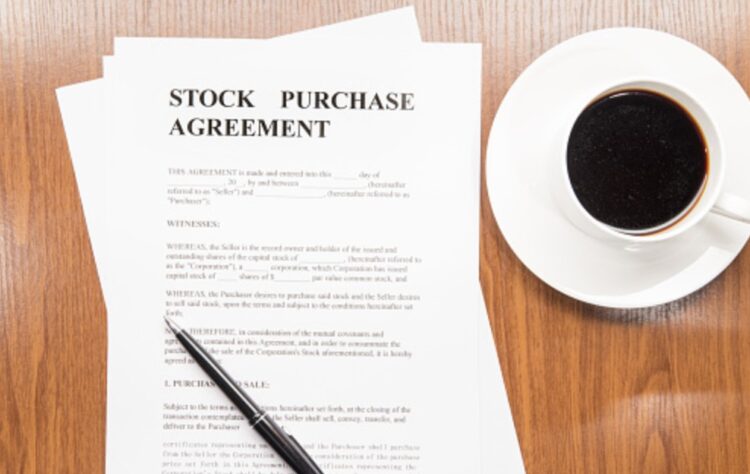
Stock purchase agreements can quickly become very important for startups and their founders. Understanding how documents and processes like this work can help reduce mistakes and liabilities, give you more negotiating power, keep your organization clean for future fundraising or exits, and will protect your assets.
Typically this will be the next step to an investor becoming really interested in your business after having reviewed your pitch deck as Alejandro Cremades outlines in his blog.

What is a Stock Purchase Agreement?
A stock purchase agreement is a legal document that outlines the terms of the transaction between a startup company and a shareholder and is sometimes called a share purchase agreement (SPA). The stock purchase agreement regulates the transfer and sale of the startup’s stock to shareholders.
A stock purchase agreement determines the stock price, how much stock will be purchased, and how the payment gets made, and will include all the terms and conditions. Simply put, it’s a binding contract between the seller and buyer of shares in a company.
An asset purchase agreement shouldn’t get confused with a stock purchase agreement. An asset purchase agreement is where instead of the shares, the assets are bought and sold. Though both can be used as a form of exit when a company is sold and acquired. Though a stock purchase agreement may be used more frequently as equity capital is raised.
There are two forms of a stock purchase agreement, namely:
- Non-restricted stock purchase agreement: The standard stock purchase agreement where you pay for your shares, and they are yours.
- Restricted stock purchase agreement: Such as a co-founder’s shares that will vest over time.
A stock purchase agreement will become essential as the startup grows and more shareholders and investors get added. The agreement will serve to protect both the seller and buyer.

The following elements get specified in a stock purchase agreement:
- Name of the company
- Purchaser’s name
- Par values of shares
- Amount of shares getting sold
- When and where the transaction takes place
- Indemnification agreement over unanticipated costs
- Warranties and representations made by the purchaser and seller
Before the agreement gets finalized, a letter of intent (LOI) is formed to explain the proposed sale. A buyer will typically conduct due diligence between the letter of intent and the purchase agreement and closing.
The seller needs to specifically check the warranties and representation section and the sale and purchase section.
- Warranties and representation: This needs to get checked to ensure there aren’t any false statements. Legal action and recourse can occur should this happen and be found at a later stage. If there are misrepresentations, a purchase price adjustment may occur after the transaction, where the buyer gets reimbursed by the seller.
- Sale and Purchase: The letter of intent and the sale and purchase section should contain the exact terms. If differences are found, it could be due to the buyer’s due diligence and there may need to be some negotiation before completing the share purchase agreement and closing.

What is the Purpose of a Stock Purchase Agreement?
The stock purchase agreement clarifies interpretation by providing definitions for all terms used in the agreement. The sale and purchase of shares are also covered, including price modifications, itemization of the purchase price, and how to settle disputes.
All of the assertions that the buyer and seller sign and claim to be true are contained in the buyer and seller’s warranties and representations.
Details of any indemnifications that the buyer or seller will provide will also get mentioned, addressing any costs that may arise after the transaction due to conditions that existed before the deal closed. The agreement also specifies any special tax treatment that the buyer or seller may be entitled to.

Reasons Why You Need a Stock Purchase Agreement
- It allows startups to bring in more capital or sell the company
- It creates a legally binding agreement governing the sale
- It outlines any special tax treatment that the signers may be entitled to due to the transfer
Before anything is official, the buyer and seller have the opportunity to evaluate the agreement

Reasons Why You Won’t Need a Stock Purchase Agreement
Because stock purchase agreements are designed to protect all parties involved, there are only a few situations in which you should not use one:
- You’re the sole shareholder in the startup and intend to remain that way
- You’re raising debt, not equity fundraising
These are the main reasons why an agreement won’t be needed. However, it’s still a good idea to understand them for future uses.

Conclusion
At the end of the day, a stock purchase agreement is significant because it has the terms of the sale in writing, and a legal battle can be avoided from any misunderstandings. This increases the buyer and seller’s trust in the deal.
In the event of potential issues a stock purchase agreement can be used to show proof of the transaction. This will be to certain degree a guarantee for both parties involved in the transaction.
Furthermore, the stock purchase agreement will serve as a guide for the execution of the transaction where all options will be listen in the event of a potential dispute down the line.
Over the long term not having a stock purchase agreement can bring a big a mount of risk to you and the business. Instead of taking the typical templates that you would find online or cheap legal services, you really want here to spend the extra time and capital with solid corporate counsel to get things done properly.
Remember as well that as the business grows and you bring in more stakeholders solid purchase agreements will allow to protect your company from potential downfalls or folks that lack integrity.
Lastly, when it comes to structure remember that they way you are stating things could bring a potential liability from a tax perspective. So you also may want to run things by your accountant to make sure that things are put in place correctly.











